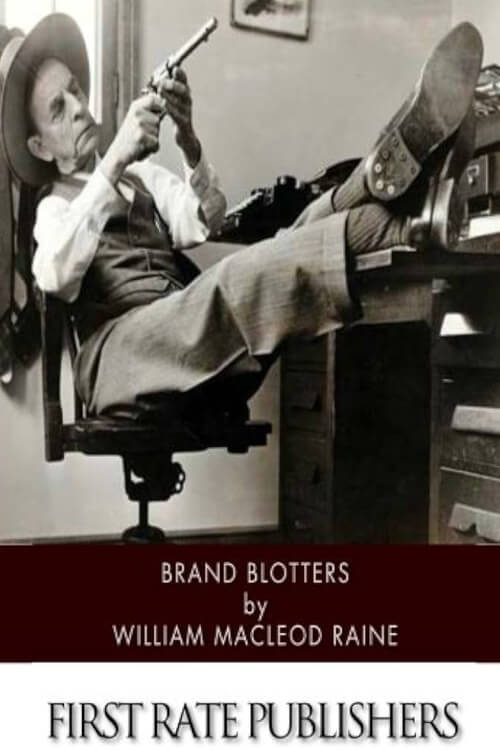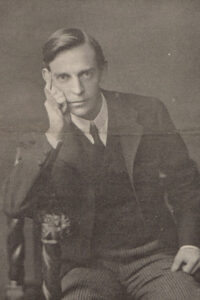
Brand Blotters
The tenderfoot rose from the ledge upon which he had been lying and stretched himself stiffly. The chill of the long night had set him shivering. His bones ached from the pressure of his body upon the rock where he had slept and waked and dozed again with troubled dreams. The sharpness of his hunger made him light-headed. Thirst tortured him. His throat was a lime kiln, his tongue swollen till it filled his mouth.
If the night had been bad, he knew the day would be a hundred times worse. Already a gray light was sifting into the hollow of the sky. The vague misty outlines of the mountains were growing sharper. Soon from a crotch of them would rise a red hot cannonball to pour its heat into the parched desert.
He was headed for the Sonora line, for the hills where he had heard a man might drop out of sight of the civilization that had once known him. There were reasons why he had started in a hurry, without a 12a horse or food or a canteen, and these same reasons held good why he could not follow beaten tracks. All yesterday he had traveled without sighting a ranch or meeting a human being. But he knew he must get to water soon—if he were to reach it at all.
A light breeze was stirring, and on it, there was borne to him a faint rumble as of thunder. Instantly the man came to a rigid alertness. Thunder might mean rain, and rain would be salvation. But the sound did not die away. Instead, it deepened to a steady roar, growing every instant louder. His startled glance swept the cañon that drove like a sword cleft into the hills. Pouring down it, with the rush of a tidal wave, came a wall of cattle, a thousand backs tossing up and down as the swell of a troubled sea. Though he had never seen one before, the man on the lip of the gulch knew that he was watching a cattle stampede. Under the impact of the galloping hoofs the ground upon which he stood quaked.
A cry diverted his attention. From the bed of the sandy wash, a man had started up and was running for his life toward the cañon walls. Before he had taken half a dozen steps the avalanche was upon him, had cut him down, swept over him.
The thud of the hoofs died away. Into the open desert, the stampede had passed. A huddled mass lay motionless on the sand in the track of the avalanche.13
A long ragged breath whistled through the closed lips of the tenderfoot. He ran along the edge of the rock wall till he found a descent less sharp, lowered himself using jutting quartz and mesquit cropping out from the crevices, and so came through a little draw to the cañon.
He dropped to a knee beside the sprawling, huddled figure. No second glance was needed to see that the man was dead. Life had been trampled out of him almost instantly and his features battered beyond any possible recognition. Unused to scenes of violence, the stranger stooping over him felt suddenly sick. It made him shudder to remember that if he could have found a way down in the darkness he, too, would have slept in the warm sand of the dry wash. If he had, the fate of this man would have been his.
Under the doubled body was a canteen. The trembling fingers of the tenderfoot unscrewed the cork. Tipping the vessel, he drank avidly. One swallow, a second, then a few trickling drops. The canteen had been almost empty.
Uncovering, he stood bareheaded before the inert body and spoke gently in the low, soft voice one instinctively uses in the presence of the dead.
Read or download Book
William MacLeod Raine
William MacLeod Raine (June 22, 1871 – July 25, 1954), was a British-born American novelist who wrote fictional adventure stories about the American Old West.
In 1959, he was inducted into the Hall of Great Westerners of the National Cowboy & Western Heritage Museum.
Life
William MacLeod Raine was born in London, the son of William and Jessie Raine. After his mother died, his family migrated from England to Arkansas when Raine was ten years old, eventually settling on a cattle ranch near the Texas-Arkansas border. In 1894, after graduating from Oberlin College, Raine left Arkansas and headed for the western U.S. He became the principal of a school in Seattle while contributing columns to a local newspaper. Later he moved to Denver, where he worked as a reporter and editorial writer for local periodicals, including the Republican, the Post, and the Rocky Mountain News.
At this time he began to publish short stories, eventually becoming a full-time freelance fiction writer, and finally finding his literary home in the novel. His earliest novels were romantic histories taking place in the English countryside. However, after spending some time with the Arizona Rangers, Raine shifted his literary focus and began to utilize the American West as a setting. The publication of Wyoming in 1908 marks the beginning of his prolific career, during which time he averaged nearly two Western novels a year until he died in 1954. In 1920 he was awarded an M.L. degree from the University of Colorado, where he had established that school’s first journalism course.
During the First World War, 500,000 copies of one of his books were sent to British soldiers in the trenches. Twenty of his novels have been filmed. Though he was prolific, he was a slow, careful, conscientious worker, intent on accurate detail, and considered himself a craftsman rather than an artist.
In 1905 Raine married Jennie P. Langley, who died in 1922. In 1924 he married Florence A. Hollingsworth; they had a daughter. Though he traveled a good deal, Denver was considered his home.
In 1928, he ghostwrote with Billy Breakenridge, the book Helldorado: Bringing Law to the Mesquite. Breckenridge had been a deputy sheriff under Johnny Behan in Tombstone, Arizona Territory during the period of the Gunfight at the O.K. Corral. Breckenridge had pressed Wyatt for details about his time in Tombstone to add to the book. It was published the year before Wyatt died. and it depicted Wyatt as a thief, pimp, crooked gambler, and murderer. The book stated that the Earps and Doc Holliday aggressively mistreated the guiltless cowboys until they were forced into a fatal confrontation. His description of the 1881 O.K. Corral gunfight stated that the Clanton and McLaury brothers were merely cowboys who had been unarmed and surrendered but the Earp brothers had shot them in cold blood. Wyatt and Josie protested that the book’s contents were biased and more fiction than fact. Earp complained about the book until his death in January 1929, and his wife continued in the same vein afterward.
Raine died on July 25, 1954, and is buried at Fairmount Cemetery in Denver. He was posthumously inducted into the Hall of Great Westerners of the National Cowboy and Western Heritage Museum in 1959.






